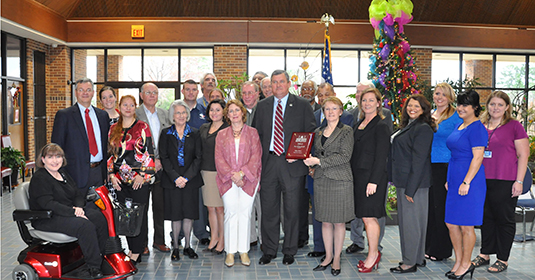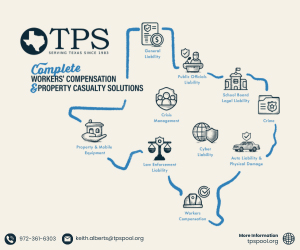By Co-Authors: Anderson County Judge Robert Johnston; Cherokee County Judge Chris Davis; Gretchen Martens, M.A., Author, “Untying the Yellow Ribbon”
 For the first time in America’s history, municipalities find themselves increasingly responsible for shouldering the burden of care for their military coming home. Texas counties will integrate an estimated 200,000 transitioning military and their families in the coming years. In fact, Texas will soon overtake California as the state with the highest number of Veterans. Nationwide, the cost for caring for transitioning military at home on Main Street is estimated to be in excess of
For the first time in America’s history, municipalities find themselves increasingly responsible for shouldering the burden of care for their military coming home. Texas counties will integrate an estimated 200,000 transitioning military and their families in the coming years. In fact, Texas will soon overtake California as the state with the highest number of Veterans. Nationwide, the cost for caring for transitioning military at home on Main Street is estimated to be in excess of
$100 billion annually to municipal governments. This will disproportionately impact budgets in Texas counties.
Transitioning military in Texas will fail or thrive depending on how successfully municipalities craft a community-based response. Adopting a proactive approach is the only way to contain these costs to Texas county budgets. Fortunately, several Texas counties are providing effective, replicable models for community response.
Smith County: A National Model for Veteran-Focused Economic Development Strategies
Smith County, home to Tyler, is rapidly becoming the national model for a Veteran- and military-friendly community. In May 2011, Tyler Mayor Barbara Bass appointed John Furlow (U.S. Army, retired) and City Council member Ralph Caraway to co-chair the Veterans and Community Roundtable, serving Smith County with outreach into the surrounding counties of rural East Texas. After studying the needs of Veterans in Smith County, the Roundtable created an action plan that focuses on five of the Points of Light Community Blueprint’s eight impact areas: employment, education, behavioral health, housing, and financial/legal services.
Entirely run by roughly 120 volunteers, many from Smith County’s Rose Capital Chapter of the Military Officers Association of America, the Roundtable and its partners host semi-annual job fairs and an annual entrepreneurship boot camp. The Tyler Chamber of Commerce, boasting 2,000-plus members from Smith County, has created a Veterans Committee which is working to bring Veteran-owned small businesses to Smith County. All three college/university campuses in Smith County now have Veteran support organizations. The annual countywide blitz to register Veterans at the VA resulted in Smith County securing a new 12,000-square-foot VA Clinic, opening in early 2014, as well as a commitment from the VA for a 50,000-square-foot VA Center in 2016.
In 2012, the Roundtable earned a Sea of Goodwill Award and in 2013 became one of only 16 Blueprint communities to earn a four-star rating. On Nov. 9, 2013, the Roundtable will be honored by the Department of Veterans Affairs for their work in Smith County. The Roundtable recently began a strategic planning process that not only better coordinates Veteran services, but creates Veteran-focused economic development in alignment with the existing Industry Growth Initiative.
Tarrant County: Transitional Housing and a United Way Grant to Shape the Future
Liberty House, a partnership between MHMR of Tarrant County and the U.S. Department of Veterans Affairs, provides transitional housing for homeless Veterans managing issues around substance abuse, PTSD, and other mental illnesses. A county building used as a drug and alcohol facility had 50 percent vacancy. Using $300,000 from county funds and $600,000 from a federal grant for renovation costs, Liberty House opened in March 2010 in the previously unused space. MHMR manages and staffs Liberty House, which can support up to 30 Veterans for up to two years. Just three years later, successful graduates are now employed at Liberty House!
The successes of Liberty House inspired its founders in May 2011, in conjunction with Tarrant County and the University of North Texas Health Science Center, to establish the Veterans Coalition of Tarrant County (VETCO), a collaboration of service providers who support Veterans and transitioning military (VeteransCoalition.org). Judge Brent Carr, who supervises Tarrant County’s Veterans Court, and Neil Strassman, County Judge Glen Whitley’s executive administrator, both sit on the VETCO board. Led by Board Chair Stevie Hansen, MHMR Director of Addiction Services, VETCO became a 501C3 in 2013.
Lockheed Martin and Bell Helicopter Textron donated $300,000 to the Tarrant County United Way’s Veterans Fund. The United Way awarded $220,000 to three nonprofits and $20,000 to VETCO for strategic planning to better coordinate services for Veterans and their families, improve inter-agency collaboration, and create shared evaluation standards.
“It’s the story of how a family came together and created…a better, brighter future for Veterans and their families in Tarrant County,” summarized Clarence Moore, a member of VETCO’s board.
Cherokee and Anderson Counties: Grassroots Efforts in Rural East Texas Making a Difference
In 2011, Judge Chris Davis and Judge Robert Johnston signed a Community Covenant, pledging support to Veteran and military families in Cherokee and Anderson counties.
“For three years, these communities have been working diligently to make East Texas an environment in which Veterans and their families thrive,” said Julianne Sanford, head of the Lone Star Military Resource Group (LSMRG).
With county support, LSMRG (LonestarMilitary.com) focuses on peer-to-peer interaction and resource referral with a warm hand-off to benefits and services. LSMRG has ambitiously addressed Veteran homelessness, creating permanent housing for almost a dozen homeless Veterans in three homes, with a fourth home planned for homeless female Veterans, in a single year. Neglected properties are renovated by volunteers, many of them former homeless Veterans, using donated materials. Homeless Veterans with VA benefits undergo a matching process and are placed in a home with their own bedroom. They are supported in learning to work together and function as a kinship group. With guidance from the Lone Star Military Farmers, some of the Veterans have started small gardens and sell produce at local farmers markets. This initiative has not cost either county a single dollar.
LSMRG hosts monthly wounded warrior and military family dinners at local restaurants, often attended by 30-40 people. They organize a multi-day Veteran Fair, Lone Star USA, which features educational sessions, booths from Veteran support organizations, a farmers market, battle re-enactments, the traveling Wall, musical guests, and other fun family activities. Last year’s event was attended by more than 3,000 Veterans, Guard, Reserve, and their families.
Judge Johnston, President of the Veterans Service Association of Palestine/Anderson County, made it possible for county Veteran Service Officers to be housed at the Veterans Resource Center.
“Judge Johnston has invested great efforts in Anderson County Veterans and has demonstrated outstanding leadership and stamina in these efforts,” Sanford said.
Seeing the Potential in Today’s Transitioning Military
Texans are bombarded with negative messaging about today’s transitioning military. Sadly, we have lost sight of the tremendous skills and experiences our transitioning military bring home (see book excerpt).
If Texas really wants to say, “Thank you for your service” in a meaningful way, our County Judges and other municipal leaders will engage in a paradigm shift where we no longer look at our military coming home as a group of needy veterans, but as a much-needed battalion of community leaders, employees, business owners and volunteers. Texas counties that pro-actively support their military coming home strengthen community, generate cost savings to local government, and create economic development on Main Street. Everyone wins!
















